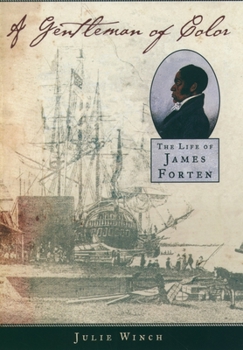A Gentleman of Color: The Life of James Forten
Select Format
Select Condition 
Book Overview
Winch has written the first full-length biography of James Forten, a hero of African American history and one of the most remarkable men in 19th-century America. Born into a free black family in 1766, Forten served in the Revolutionary War as a teenager. By 1810 he had earned the distinction of being the leading sailmaker in Philadelphia. Soon after Forten emerged as a leader in Philadelphia's black community and was active in a wide range of reform activities. Especially prominent in national and international antislavery movements, he served as vice-president of the American Anti-Slavery Society and became close friends with William Lloyd Garrison to whom he lent money to start up the Liberator. His family were all active abolitionists and a granddaughter, Charlotte Forten, published a famous diary of her experiences teaching ex-slaves in South Carolina's Sea Islands during the Civil War. This is the first serious biography of Forten, who stands beside Harriet Tubman, Frederick Douglass, Booker T. Washington, and Martin Luther King, Jr., in the pantheon of African Americans who fundamentally shaped American history.
Format:Paperback
Language:English
ISBN:0195163400
ISBN13:9780195163407
Release Date:June 2003
Publisher:Oxford University Press
Length:528 Pages
Weight:1.67 lbs.
Dimensions:1.2" x 6.4" x 9.2"
Customer Reviews
2 ratings
A forgotten face of American history
Published by Thriftbooks.com User , 15 years ago
This is a well-researched and absorbing account of an important African-American figure in the formative decades of independence. Because his prime years and influence came well-before the Civil War and the end of slavery, James Forten is largely forgotten except by those who make it their business to know and understand the African component of American history and culture.
An American Hero, No Longer Unknown
Published by Thriftbooks.com User , 22 years ago
There was a Revolutionary War sailor who was captured by the British and was offered British citizenship instead of being a prisoner. He insisted he was a loyal American. He went on, as if in a Horatio Alger story, to become a successful Philadelphia businessman, but he was nonetheless encouraged, because of his heroic service in the war, to apply for the pension that he deserved from the country he had helped make. He replied that he did not want money from his country. He wanted only one thing from America, and if any American deserved it, he surely did. What James Forten wanted was to become an American citizen, and he never in his long life got his wish. The simple reason was that he was black. Forten has largely been forgotten, which is too bad, since as a war hero, businessman, and abolitionist, he played commendable roles which one doesn't have to be of any particular race to admire. He is now rescued from obscurity by a large, detailed, and well-researched biography, _A Gentleman of Color: The Life of James Forten_ (Oxford University Press) by Julie Winch. Winch has dug deep inside such ephemera as the social history of Philadelphia, the economic forces of the time, and even the trade of sailmaking by which Forten made his living, to give the first complete picture of one of the first outstanding black Americans. After his service in the war, Forten was apprenticed by the white, slave-owning sailmaker who had employed his father. He did so well that upon retirement, the owner left him the business. He branched out into real estate and money-lending. As a successful businessman, he became a civic leader, helping to administer his church and assisting in creating schools for black youth. He administered a mixed-race workforce, with some black managers supervising white workers. He could not vote, but he had no compunction about telling his workers how they were to vote and making sure they did so. He knew that he had an easier life in Philadelphia than he would in other parts of the nation, but he endured the contempt of many white people, a contempt that cycled inversely with prosperity; when times got tough, it was easy to blame blacks for taking jobs. Such blame could easily take the form of violence against the person or the property of blacks. There was a kidnapping ring that could spirit black children to Delaware and ship them into slavery in the south. Forten served in the American Anti-Slavery Society and lent his considerable finances and managerial skill to various abolitionist causes. He lent Garrison the money by which the famous abolitionist paper _The Liberator_ was begun. He wrote for the paper. He campaigned against the use of alcohol. He had a lifetime fight against blacks and whites who were pushing to move black people back to Africa, for he wanted America to be a nation without regard to color. He was not without controversy, even among blacks, but when he died in 1842, thousands of black and whit






